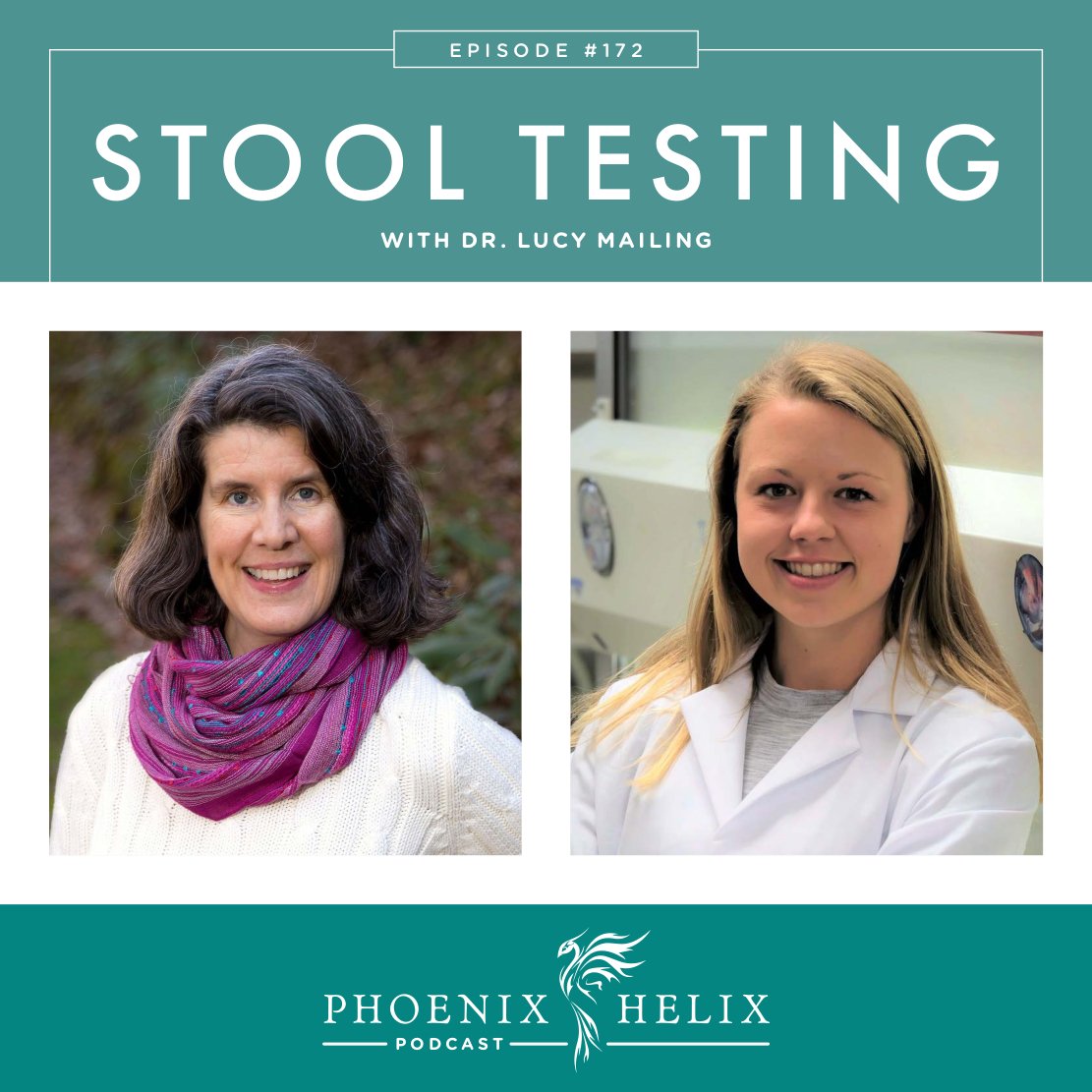A Detailed Stool Test Comparison
Stool testing is one of the first tests run by functional medicine practitioners, because gut health and autoimmune health are intimately connected. However, not all tests are the same. What are the different types? Which are the most accurate? What can and can’t they tell us? What are some stool testing myths? And how can they help us on our health journeys? We answer these questions in today’s podcast. My guest is Dr. Lucy Mailing, a research scientist specializing in gut health, the microbiome, and nutrition science.
Listen to the Show
- Subscribe to my podcast through your favorite podcast app: iTunes, Stitcher, Google, TuneIn, Spotify, Amazon, etc.
- You can also listen to the episode right here through the player below, and if you subscribe to my newsletter you’ll get notified of future episodes.
Podcast: Play in new window | Download
Show Notes
- Intro (0:00)
- Thank You To Our Podcast Sponsor – Luminance Skincare (2:00)
- This week, I’m highlighting their hair care line. They have a gentle, non-toxic shampoo that removes dirt and grime while keeping your hair’s natural oils intact. They have a hair serum that works like a leave-in conditioner, reducing frizz and giving your hair softness and bounce with no heavy chemicals to weigh it down. And for the men in our audience, they also have a beard oil that my husband loves.
- Whereas conventional skincare products are full of chemicals that can hurt our bodies, Luminance is made from ingredients that nourish. Their products are natural, organic, wildcrafted, non-GMO, and gluten-free (and they’re even made in a dedicated gluten-free facility). They’re also handmade in small batches within the United States.
- They have a complete face and body care line, including cleansers, toners, moisturizers, masks, acne serum, sunscreen, haircare, and more.
- Place an order here, and use the code HELIX for 10% off your first order.
- Meet Dr. Mailing (3:18)
- Dr. Lucy Mailing is a research scientist specializing in gut health, the microbiome, and nutrition science. Her stool testing expertise comes from both her graduate school training and her clinical practice. In graduate school, her research focused on the impact of diet and exercise on the gut microbiome. She employed a wide variety of stool testing technologies in her research and understands the science deeply. In her clinical practice, she analyzes stool testing reports with the goal of maximizing her client’s health.
- Listen to our prior interview: Ep. 133 – The Gut Microbiome.
- Types of Stool Tests (4:51)
- Culture-Based: This is the oldest technology. Stool is added to a petri dish in the lab and watched to see which microbes multiply. This was thought to identify which microbes were contained in the stool. However, we now know this isn’t an accurate methodology because it favors oxygen-loving bacteria (many of which are pathogens) and misses the anaerobes (many of which are beneficial). Culture-based tests miss 95% of the microbes contained in the stool, and show pathogens in higher concentration than is true.
- Genetic: These tests sequence the DNA or RNA of the microbes in the stool. These are also called molecular-based stool tests. There are three types:
- 16S rRNA gene sequencing – All bacteria contain a 16S gene that’s unique to that bacteria. It’s like a bacterial fingerprint. This technology accurately identifies the types and balance of bacteria, but it can’t identify fungi or parasites, so it doesn’t give a complete picture of the microbiome. It also only identifies the genus, not the species. So it can find Lactobacillus, but not know which type of Lactobacillus is there. (Thryve is a lab that uses this technology.)
- Targeted PCR – This test uses specific “primers” to look for specific microbes (which is why it’s called targeted testing). It’s very accurate in its identification but can’t catch all the microbes, because they don’t have primers for all of them. However, unlike the 16S testing, it can identify down to the species level for the microbes it’s looking for. So, it can identify Lactobacillus plantarum vs. Lactobacillus rhamnosus, for example. This test can also look for fungi, viruses, and parasites, as long as it has primers for them. (Labs that use this technology include Doctor’s Data GI 360, Genova GI Effects, and GI-MAP.)
- Metagenomics – This test uses deep genetic sequencing to identify every single gene in the microbiome. It’s the most accurate test, covering all categories of microbes, but it’s also expensive. (Labs that use this technology include Onegevity, Sungenomics, and Microba).
- Dr. Mailing’s Preferred Labs (12:08)
- While different labs may employ similar methodology, there’s varying quality between labs. Many functional medicine practitioners don’t just have preferred tests, but also preferred labs to run those tests. Dr. Mailing’s preferred labs and tests are:
- Genova GI Effects – this is the test she recommends the most. It’s a targeted PCR test that looks for parasites, yeast, and bacteria. It also includes clinical markers for digestion and absorption, gut inflammation, and gut immune function.
- Doctors Data GI 360 – this is a high-quality test as well. It’s also a targeted PCR test that has a slightly different blend of primers, so its report isn’t identical to Genova’s but it’s close. Dr. Mailing prefers the primers used by Genova right now, but if your doctor prefers Doctors Data, that’s a fine choice, too.
- Note: Both tests above include a cultured stool test as well. Dr. Mailing recommends you ignore that part of the report completely, because it’s not accurate. She wishes they would remove that from their report.
- Onegevity – Dr. Mailing will recommend this test for some clients if there are lingering questions that the GI Effects test didn’t answer. The science behind Onegevity is strong, but the consumer report isn’t very helpful and includes personalized recommendations that aren’t supported by current research. Instead, she digs into the raw data. Metagenomics technology lets scientists see what they’ve never been able to see before and it will lead to scientific knowledge and discovery, but there’s still a lot of unknowns when it comes to gut microbes and their function. Dr. Mailing finds this test most useful in spotting stealth infections that don’t show up on other tests.
- While different labs may employ similar methodology, there’s varying quality between labs. Many functional medicine practitioners don’t just have preferred tests, but also preferred labs to run those tests. Dr. Mailing’s preferred labs and tests are:
- Labs She Doesn’t Recommend (13:52 & 18:17)
- Culture-based stool testing. This is outdated technology that misses 95% of the microbes and therefore presents an inaccurate picture of gut health.
- GI-MAP – Although this is also a PCR test, Dr. Mailing doesn’t believe this lab is as reliable as the ones recommended above. Practitioners have sent the same stool sample under different names to GI-MAP to test the quality of their reporting. There were discrepancies between the reports, particularly in the clinical markers section. When GI-MAP was approached about the error, the CEO didn’t express any interest in addressing the problem.
- Viome – This is a gut health test marketed directly to consumers that gives personalized recommendations for diet and supplements based on the test results. It uses a technology called metatranscriptomics, which looks at the RNA of all the microbes in the gut. While this test can accurately identify microbes, scientific knowledge hasn’t reached the point where personalized diet and supplement recommendations are possible, so those should be taken with a grain of salt.
- What Stool Tests Can & Can’t Tell Us (23:25)
- How they can be helpful:
- They can screen for parasitic infection, yeast overgrowth, bacterial imbalances, or pathogenic overgrowth.
- Tests that include clinical markers (like GI Effects) can show how well you digest and absorb your food, and also catch signs of gut inflammation.
- What they can’t do:
- They can’t tell you what diet is best for you, what probiotics to take, or which prebiotics would be most beneficial. Although some testing companies give these recommendations, they’re not supported by current science.
- There is also no single recipe for a healthy microbiome. Some people zero in on one beneficial microbe they want to increase or one pathogen they want to decrease, but it’s all about the health of the entire “garden” of microbes and that’s unique to each individual. (Resource: Ep. 133 The Gut Microbiome).
- Test results aren’t more important than patient symptoms. Dr. Mailing cares a lot more about how a person feels than what their lab reports says about the “health” of their gut.
- How they can be helpful:
- Thank You To Our Podcast Sponsor – Functional Nutrition Alliance (29:44)
- Full Body Systems is an internationally acclaimed, 10-month online functional nutrition immersion training program.
- It’s designed by world-renowned educator, Andrea Nakayama. Many of you know her as one of my most popular podcast guests. Her unique way of working with patients often leads to results where other practitioners hit dead ends. This program teaches you to do the same.
- If you’re already trained as a health coach, nutritionist, or medical practitioner and want to more effectively help your clients break through healing plateaus, this class is for you!
- And if you’re an aspiring practitioner just getting started, this might be the only training you need.
- You’ll gain detailed knowledge of all the systems in the body, how they interact, how problems develop, and how to personalize diet and lifestyle recommendations for each unique client.
- Enrollment is currently open. To learn more, visit FxNutrition.com/Eileen.
- How Dr. Mailing Uses Stool Testing in Her Clinical Practice (31:15)
- Disclaimer: Dr. Mailing is a research scientist and gut microbiome expert, but she’s not a doctor. She’s a consultant. She doesn’t diagnose or treat. Her clients work with other practitioners who order the tests, and Dr. Mailing helps interpret them.
- Some clients come to her with stool testing reports they’ve already received. For those looking for test recommendations, she usually suggests the GI Effects targeted PCR test. If she suspects an infection or wants a more complete look at the microbiome, she might also recommend Onegevity.
- Based on the stool test report(s) alongside the presenting symptoms of her client, they’ll discuss potential diet and lifestyle changes, supplements to consider, and medication considerations if an infection is present. The client will then bring this information to their doctor to make the final decisions on treatment.
- The microbiome is very dynamic and can respond quickly, especially to dietary changes. Many clients experience some symptoms improvement within days, but it can take longer. Dr. Mailing recommends trying an approach for 1-2 months. If the progress has plateaued at that point or the treatment’s not working at all, they’ll consider other options. That’s the “trial and error” part of healing.
- Case Study Example #1: A client presents with diarrhea and bloating, and her test shows hydrogen sulfide overgrowth. Dr. Mailing may recommend a diet that’s temporarily low in animal protein and fat, because those can feed the overgrowth. (This would be a short-term diet to correct the dysbiosis; Dr Mailing believes animal foods are too beneficial to health to eliminate long-term). She might also suggest some nutrients that help mitigate hydrogen sulfide production, like molybdenum and selenium.
- Case Study Example #2: A client presents with IBS and autoimmune symptoms, and their stool test shows a giardia parasite and high red blood cells. In this case, a pharmaceutical anti-parasitic might resolve the IBS and even improve autoimmune symptoms if they are being triggered by gut inflammation. Dr. Mailing would suggest a butyrate supplement simultaneously to support the gut barrier and speed the return of a healthy ecosystem. While anti-parasitics and antibiotics are sometimes necessary, they do temporarily wipe out butyrate-producing bacteria. Butyrate is a major fuel source for the cells that line our intestine.
- Who Should Get a Stool Test? (38:12)
- If you are healthy, there’s no need to get a stool test unless you’re simply curious to see your microbiome. In that case, Dr. Mailing warns against obsessing over the results. How you feel is more important than what a lab report says. When someone feels great, she rarely recommends intervention no matter what shows up on the test.
- If you have health issues, Dr. Mailing recommends addressing diet, sleep, stress, and other lifestyle factors first. These are the foundation of health and can often correct gut issues without further intervention. If you try to bypass these steps and treat the gut without addressing these issues, it’s rarely effective long-term.
- If you have diet and lifestyle dialed in and are still experiencing symptoms: gut symptoms, autoimmune symptoms, or other health issues, a stool test may be helpful. Gut health can impact health bodywide, and a test might reveal areas to troubleshoot.
- Costs of Stool Tests (41:47)
- 16S stool tests average $75. They’re the least expensive option and can give you an overview of bacteria balance. They’re not as thorough or accurate as the more expensive tests and don’t include clinical markers, but they’re a budget choice.
- Targeted PCR tests range from $230 (if you can run it through insurance) to $400+ if you buy it directly.
- Metagenomics tests average $350.
- How Often to Test? (43:22)
- For many people, one test is enough. After that, Dr. Mailing looks for symptom improvement to track success of treatment. The exception to this rule would be infections (like parasites) where you want to make sure the infection has been cleared.
- Can You Order Tests Independently? (44:05)
- There are tests marketed directly to consumers (like Viome). Dr. Mailing doesn’t recommend those because the reports give personalized recommendations not supported by science.
- You can order many of the functional medicine stool tests directly from the labs if you don’t have a practitioner. However, they’re difficult to interpret without an expert analyzing your results in relation to your health issues. But if your doctor won’t order a test for you, it’s nice to have the option to order it directly, and some of the test companies do have interpretive tests online. However, be careful choosing interventions without professional guidance.
- uBiome Scandal (47:20)
- This was a 16S stool testing company that many people used. It turns out there was a lot of fraud behind the scenes, including financial fraud and insurance fraud. The former owners are literally “on the run” to avoid criminal conviction.
- There’s a lot of money to be made in stool testing, and some companies are going to pursue profits over ethics or science. How do you know who to trust? There are no easy answers here. Do your research and then make your best choice, knowing that most companies are ethical. You can also follow Dr. Mailing, who stays up-to-date on the current reputation of various companies, and also the latest in microbiome science.
- Outro (50:35)
- You can connect with Dr. Lucy Mailing through her website. She is accepting new 1:1 clients, and she also writes a monthly research digest for her Patreon supporters.
- Eileen (your podcast host) is the author of multiple books, written to help people thrive with autoimmune disease. Learn more on the Books Page.
- If you like this podcast, follow or subscribe through your favorite podcast app. You can also subscribe to Eileen’s biweekly newsletter.
- Check out the entire archive of podcast episodes.
You May Also Be Interested In
Spreading the Word
If you like the podcast, please leave a positive review in iTunes. It would mean the world to me, and also helps others find the podcast. Here are some quick instructions using your iPhone:
- If you are already subscribed to my podcast: (1) Click the purple podcast icon. (2) At the bottom of the screen, click Library. (3) At the top of the screen, click Shows. (4) Click the Phoenix Helix podcast image. (5) Scroll down the page, and you’ll see Ratings and Reviews. Scroll down a little bit more and click on Write a Review. This will bring up the review screen. Tap 5 stars (if you love the podcast), and then click in the title box, and it will bring up the keyboard. Enter a title and short review. (6) Click Send in the upper right corner. (7) Thank you! Positive reviews give the podcast a higher search ranking in iTunes, helping people find it and letting them know it’s a quality podcast and worth their time to listen.
- If you haven’t subscribed to my podcast: (1) Click the purple podcast icon. (2) In the lower right corner, click the magnifying class. (3) Type Phoenix Helix in the search box. (4) Click the podcast cover in the Show list. (5) If you’d like to subscribe, click the + sign at the top of the screen. (6) To write a review, scroll down the page, and you’ll see Ratings and Reviews. Scroll down a little bit more and click on Write a Review. This will bring up the review screen. Tap 5 stars (if you love the podcast), and then click in the title box, and it will bring up the keyboard. Enter a title and short review. (7) Click Send in the upper right corner. (8) Thank you! Positive reviews give the podcast a higher search ranking in iTunes, helping people find it and letting them know it’s a quality podcast and worth their time to listen.








